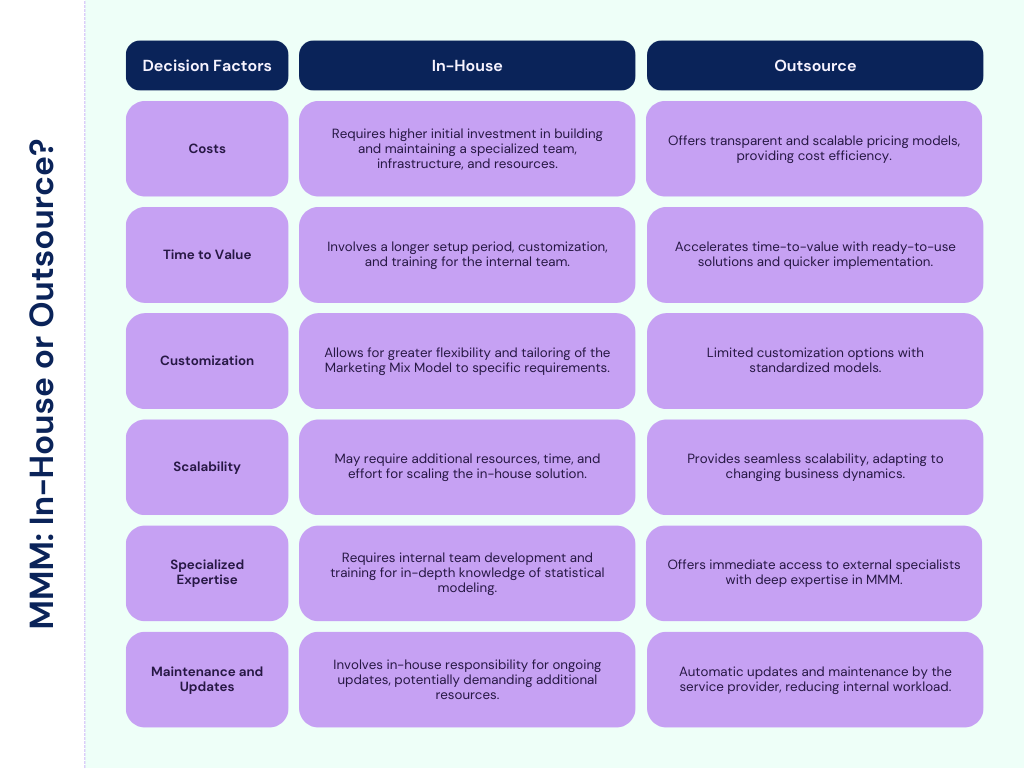The MMM Dilemma: In-House or Outsource?
Precision and effectiveness are more important than ever in marketing today, both online and offline, especially when it comes to measurement. With constant updates and changes to keep track of, marketing mix modeling (MMM) is a great guide for organizations dealing with the complexities of measurement. At the heart of this analytical approach lies the power to understand the impact of various touch points and optimize budget allocation.
As part of this exploration of marketing mix modeling, it's essential to acknowledge the transformative role played by accessible packages such as LightWeightMMM, Robyn, and PyMC-Marketing. These tools have democratized MMM and fueled a critical question for marketing teams: Should we make or outsource our marketing mix modeling?

What is Marketing Mix Modeling (MMM)?
Before getting stuck into the make or outsource decision, it’s important to have at least a basic understanding of MMM and its aims. Marketing mix modeling is a powerful measurement technique that provides a quantifiable assessment of how different marketing activities influence KPIs like sales and revenue. Through careful analysis, including regression techniques, it pinpoints the effectiveness of each marketing channel in terms of Return on Investment (ROI).
At its core, MMM goes beyond the surface-level metrics, diving into the holistic view of marketing strategies. It's about more than just running a model; it's about continually feeding the model with high-quality data, performing complex calculations, and seamlessly delivering results to end-users through automated processes like feeding data into dashboards and analyzing the data.
If you feel you need a more detailed understanding of MMM, check out our comprehensive guide: Everything You Need to Know About Marketing Mix Modeling and How to Get Started
In the forthcoming sections, we discuss the considerations that play a pivotal role in the "make or outsource" dilemma. We aim to equip you with the insights to navigate this crucial decision in your MMM journey. So, let's weigh the options and assess the trade-offs.
The Trade-Offs: Make or Outsource?
As companies consider integrating Marketing Mix Modeling (MMM), a pivotal decision looms: whether to develop an in-house solution or use external expertise through outsourcing. Let’s have a closer look at the factors influencing the decision.

1. Costs
When contemplating the implementation of Marketing Mix Modeling (MMM), financial considerations stand as a pivotal factor in the decision-making process.
Outsourcing to an MMM Provider:
Choosing an MMM vendor offers cost efficiency. With transparent and scalable pricing models, businesses gain clarity on expenditures. Scalability ensures flexibility, allowing adjustments of expenses according to MMM needs and providing a streamlined and adaptable financial approach.
In-Housing a Complete MMM Product:
Contrastingly, developing an in-house MMM solution is a substantial financial commitment. It involves hiring data scientists, engineers, and allocating resources. The investment spans setup, maintenance, and ongoing team expenses, presenting a more intricate and potentially higher-cost structure.
2. Time to Value
Time to value isn't just about speed; it's the measure of transforming insights into actionable outcomes swiftly. In the fast-paced world of marketing, where being agile is crucial, this metric acts as a guide for businesses to swiftly and precisely implement well-informed strategies.
Outsourcing to an MMM Provider:
Opting to outsource to an MMM vendor significantly accelerates time to value. Vendors often provide ready-to-use solutions, minimizing the time needed for infrastructure setup and model development. With streamlined onboarding processes, businesses can swiftly integrate MMM into their operations, translating to faster access to valuable insights and quicker implementation of informed marketing strategies.
In-Housing a Complete MMM Product:
Conversely, developing an in-house MMM solution extends the time to value. The intricate process involves not only setting up infrastructure and customizing models but also dedicating time to train a specialized team. This timeline can delay the realization of insights, potentially impacting the agility of marketing strategies.
3. Customization
As we delve into customization in Marketing Mix Modeling (MMM), it's more than adjustments; it's about crafting a solution that fits the distinct needs of each business.
Outsourcing to an MMM Provider:
When outsourcing, customization options may have some limitations, depending on the vendor. Marketing mix modeling providers generally provide standardized models designed to suit a wide range of businesses. While this streamlined approach ensures efficiency and easy implementation, it may involve adapting the MMM model to accommodate specific nuanced needs.
In-Housing a Complete MMM Product:
In contrast, opting for an in-house MMM solution can often provide a greater degree of customization. Businesses have the freedom to tailor the MMM model precisely to their specific requirements. This flexibility allows for the incorporation of unique variables and considerations that are integral to the organization's marketing strategies. However, this increased customization comes with the responsibility of managing the intricacies of a tailored solution.
4. Scalability
Scalability ensures MMM solutions flexibly meet evolving data needs, processing requirements, and the dynamic demands of modern marketing. Let's explore how this adaptability optimizes MMM operations for the challenges of today's business landscape.
Outsourcing to an MMM Provider:
Selecting a good MMM provider inherently ensures scalability. These platforms are designed to effortlessly accommodate fluctuations in data volumes, processing requirements, and business expansion. The dynamic nature of SaaS allows businesses to scale their MMM operations seamlessly, ensuring adaptability to evolving marketing strategies and varying levels of analytical demand.
In-Housing a Complete MMM Product:
In-housing an MMM solution, on the other hand, may present challenges in scalability. The process of scaling an in-house solution demands additional resources, infrastructure adjustments, and potential recruitment to manage the heightened workload. This complexity can introduce delays and hinder the agility needed to swiftly respond to the evolving needs of the business.
5. Specialized Expertise
Specialized expertise ensures that the intricate statistical modeling and data analysis integral to MMM are handled by seasoned professionals.
Outsourcing to an MMM Provider:
Opting for outsourcing to an MMM platform brings the advantage of leveraging the specialized expertise of external providers. These providers typically maintain teams of professionals with in-depth knowledge of MMM intricacies who have substantial expertise and experience with many unique MMM projects. This external expertise ensures that the modeling process is handled by specialists who are well-versed in the nuances of statistical analysis and can deliver accurate and reliable insights.
In-Housing a Complete MMM Product:
On the flip side, developing an in-house MMM solution requires building and maintaining a specialized team internally. This involves recruiting data scientists and engineers with a high level of expertise in statistical modeling. While this grants businesses direct control over their team, it also demands a substantial investment in talent acquisition and retention as well as ongoing training to stay on top of evolving MMM methodologies.
6. Maintenance and Updates
Regular upkeep and updates are the keys to keeping the model not just current but resilient in the face of evolving marketing challenges.
Outsourcing to an MMM Provider:
When outsourcing to an MMM vendor, the responsibility for routine maintenance and updates often falls on the service provider. MMM providers typically handle automatic updates, ensuring that the MMM model remains current and relevant. This relieves businesses of the burden of day-to-day maintenance tasks, allowing them to focus on strategic objectives rather than routine updates.
In-Housing a Complete MMM Product:
In contrast, in-housing an MMM solution means that the internal team is responsible for managing routine updates and maintenance. This involves dedicating resources to staying informed about the latest methodologies, implementing updates, and ensuring the longevity of the MMM model. While this approach provides direct control, it demands a commitment to ongoing maintenance efforts.
Conclusion
As we wrap up our pros and cons of in-house and outsourcing MMM, one key takeaway is clear: the choice between building an in-house solution or using external expertise via an MMM vendor is closely tied to what each organization specifically needs and can handle.
So, it's really important to emphasize the need for evaluation. Taking a good look at your business, digging into what kind of analysis you need, and figuring out your strategic goals, are the building blocks for making a smart decision.
If you would like to learn more about our MMM solution, check out Adtriba Sphere and discover how you can take your marketing optimisation to the next level.
-1.png?width=587&height=307&name=Untitled%20design%20(6)-1.png)